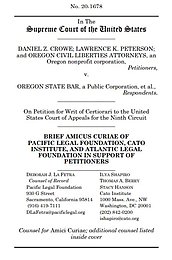Learn more about Cato’s Amicus Briefs Program.
Daniel Crowe and Lawrence Peterson are lawyers in Oregon who are compelled to pay dues to the state bar association if they wish to practice law in the state. The annual dues vary based on membership classification and run from $617 for full dues‐paying members to $150 for retired members.
The Oregon State Bar Association is very politically active. For example, in its Bar Bulletin, it called for limitations “to address speech that incites violence” and criticized a Trump Administration executive order on immigration. The Oregon State Bar has also made many other negative comments about the Trump administration, including an assertion that its base of support was rooted in white nationalism.
Crowe and Peterson are forced to partially fund the bar association’s political activities through their bar dues. Given the choice, they would not have voluntarily paid for such activities because they disagree with many of the bar’s positions. So they sued the Oregon State Bar to be released from the compelled‐membership and compelled‐dues requirements.
The First Amendment not only protects the freedom to speak, it also protects the freedom not to speak and not to be forced to subsidize speech. Moreover, in 2018, the Supreme Court decided Janus v. AFSCME, holding that the First Amendment prohibits mandatory public‐sector union fees for non‐member employees. That decision called into question two earlier decisions, Lathrop and Keller, which upheld compelled‐dues bar associations.
Crowe and Peterson lost their free speech challenge at the district court and the Ninth Circuit because Keller was not expressly overruled by Janus. The Ninth Circuit concluded that Keller allows states to compel attorneys to fund a bar association’s “germane” political and ideological speech.
Now on petition to the Supreme Court, Crowe and Peterson ask the Court to rectify the obvious inconsistencies between Janus and Keller and hold that compelled‐dues bar associations are as unconstitutional as compelled‐dues public‐sector unions. Cato has joined the Pacific Legal Foundation and the Atlantic Legal Foundation on an amicus brief urging the Supreme Court to take the case.
We argue that bar associations across the country routinely engage in blatantly political activities, including taking positions on gun control, environmentalism, abortion, and much more. Using mandatory dues to fund those activities implicates deep First Amendment concerns. Janus was an important decision about compelled speech, and its logic applies equally to ideologically driven bar associations. The Court should take Crowe and Peterson’s case and reaffirm the principles of Janus.

This work is licensed under a Creative Commons Attribution-NonCommercial-ShareAlike 4.0 International License.


